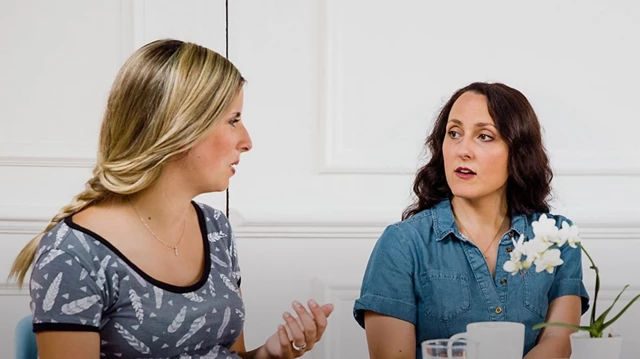Reasons to talk to your baby before birth
First impressions
Getting to know each other
It may feel like a silly or one-sided conversation, but talking to your baby while they’re still in the womb helps you to build a lasting bond. What’s more, bonding with your bump helps your baby learn. It’s easy to do – and dad can get involved too.
We also explore more ways you can encourage your baby’s early language development in our Hello In There series.

Pregnancy talk
Your voice does great things for your baby. Studies show that the sound of it is calming, both in the womb and when you finally get to meet them as a newborn. Scientists have recorded that unborn babies clearly respond to different vibrations and sounds with changes in their heart rate or movement patterns, and are particularly responsive to the sound of their mother’s voice1,2. This has led them to conclude that your unborn baby learns to recognise and remember your voice during your pregnancy. This means the conversations that you have with your bump in the third trimester are laying the foundations for their social and emotional development, as well as their language skills and memory. Your voice is already shaping their understanding of the world.

Your unborn baby learns to recognise and remember your voice during your pregnancy
Although talking to them in the earlier part of your pregnancy may help you feel closer to your baby, their ears won’t be fully developed until around the 20th week, and their auditory system doesn’t connect to their brain until at least a month or so later3. Research has shown that while some babies react to sound at as early as 24 weeks, most start to respond to external noise between 26 and 30 weeks2.
Foetal and newborn heart rates decreased when their mothers spoke – a possible sign of relaxation
How to bond with your baby
The sound of your voice has the most calming effect on your unborn child. One study found that foetuses respond to their mothers’ voices by slowing their movements, while another revealed that foetal and newborn heart rates decreased when their mothers spoke – a possible sign of relaxation3,4.
Talking and singing to your bump can be a lovely way to start building a relationship with your unborn baby and can benefit you as well as them. Incredibly, bonding with your bump can help your baby learn. But if you don’t feel comfortable with the idea, don't worry. While in your womb, your baby will hear and feel the vibrations of your voice every time you speak to anyone. They will have learnt to recognise and be comforted by your voice by the time they’re born, even if you don't speak to them directly4. This recognition will help them to bond with you and the sound will make them feel emotionally secure for many years to come.
Bonding with dad
Dad has to make a bit more effort to be heard, but if he talks to the bump it may help your baby to recognise his voice too. A fascinating study of preterm babies (who are likely to have the same hearing development as a foetus in the later stages of pregnancy) showed that they were more attentive to lower pitched sounds than higher pitched ones5. We also know that unborn babies can remember and recognise different noises, so it’s likely fathers can start building their relationship with their children before they’re born. Encouraging dad to talk to the bump about their day, hobbies or interests, can help them to feel more involved in your pregnancy too. And although your baby won’t yet understand what’s being said, it’s great to know that in the third trimester, at least, they’re listening and already getting to know a bit about their family.
 Fathers can start building their relationship with their children before they're born.
Fathers can start building their relationship with their children before they're born.
Next steps
- Studies show that high levels of stress can negatively affect the development of baby’s immune system6,7. What better excuse to put your feet up? Spending a few minutes calmly talking or singing to your bump is a great way to relax.
- If you’re stuck for something to say, why not read aloud? A newspaper or magazine article is fine, but if you enjoy it, why not try out a favourite children’s book or nursery rhyme? You can even personalise your own small story written and illustrated by an award winning children's author.
- See if you notice any changes in your baby’s behaviour. Remember the baby will find your voice calming, so expect less movement rather than more.
- Get dad and other family members involved too. They’ll have to get really close to the bump to be heard, so make sure you’re comfortable.
To learn more about what your baby hears in the womb, and how it affects their development, explore more articles in our Hello In There series.
related articles
Read more

Need some help?
You can get quick answers to common questions in our FAQs.
Alternatively, if you need help with general pregnancy or baby advice, or maybe on using or ordering our products - our expert team are always on hand to talk about feeding your baby.
- Lecanuet JP, Schaal B. Fetal sensory competencies. Eur J Obstet Gynecol Reprod Biol 1996;68:1-2.
- Voegtline KM et al. Near-term fetal response to maternal spoken voice. Infant Behav Dev 2013;36:526-33.
- Graven SN, Browne JV. Auditory development in the foetus and infant. Newborn Infant Nurs Rev 2008;8(4):186-93.
- Fifer WP, Moon CM. The role of mother’s voice in the organization of brain function in the newborn. Acta Paediatr Suppl 1994;397:86-93.
- Lee H, White-Traut R. Physiologic responses of preterm infants to the male and female voice. Journal Pediatr Nurs 2014;29:e3-5.
- Marques AH, Bjorke-Monsen AL, Teixeira AL, Silverman MN. Maternal stress, nutrition and physical activity: impact on immune function, CNS development and psychopathology. Brain Research. 2015;1617:28–46.
- Vianna P, Bauer ME, Dornfeld D, Chies JAB. Distress conditions during pregnancy may lead to pre-eclampsia by increasing cortisol levels and altering lymphocyte sensitivity to glucocorticosteroids. Medical Hypotheses. 2011;77:188–91.
Last reviewed: 19th June 2016






